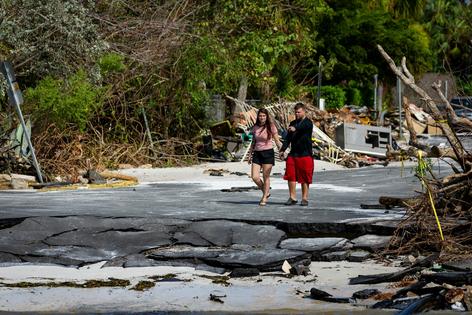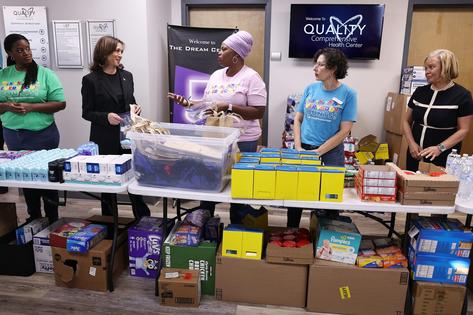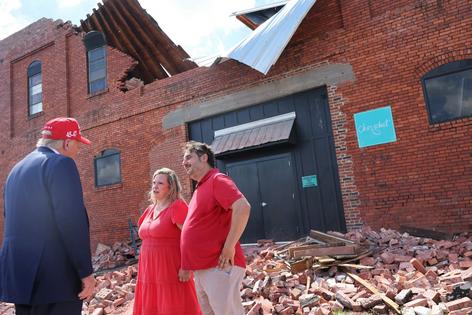A devastating hurricane doesn’t dramatically change how people vote – but in a close election, it can matter
Published in Political News
North Carolina and Florida are changing administrative rules and, in some cases, issuing emergency funding that is intended to make it easier for people in areas damaged by Hurricanes Helene and Milton to vote.
The recovery in both states is expected to extend far beyond the November 2024 election period. The majority of the people in the affected communities in North Carolina and Florida voted for Republican presidential nominee Donald Trump in 2020, making some election analysts wonder if some Trump supporters will be able to cast their ballots.
Amy Lieberman, a politics and society editor at The Conversation U.S., spoke with Boris Heersink, a scholar of voters’ behavior after a natural disaster, to better understand if and how the recent hurricanes could shift the results of the 2024 presidential election.
A massive hurricane disrupts people’s lives in many important ways, including affecting people’s personal safety and where they can live. Ahead of an election, there are a lot of practical limitations about how an election can be executed – like if a person can still receive mail-in ballots at home or elsewhere, or if it is possible to still vote in person at their polling location if that building was destroyed or damaged.
Another issue is whether people who have just lived through a natural disaster and will likely be dealing with the aftermath for weeks to come are focused on politics right now. Some might sit out the election because they simply have more important things to worry about.
The other side of the equation, which is what political scientists like myself are mostly focusing on, is whether people take the fact that a natural disaster happened into consideration when they vote.
Two scholars, Christopher Achen and Larry Bartels, have argued that sometimes voters are not great at figuring out how to incorporate bad things that happened to them into a voting position. In some cases, it is entirely fair to hold an elected official responsible for bad outcomes that affect people’s lives. But at other moments, bad things can happen to us without that being the fault of an incumbent president or governor. And voters should ideally be able to balance out these different types of bad things - those it is fair to punish elected officials for, and those for which it isn’t fair to hold them responsible.
After all, a devastating hurricane is terrible, but it is not Kamala Harris’ fault that it happened. But Achen and Bartels argue that voters frequently still punish elected officials for random bad events like this.
Their most famous example is the consequences of a series of shark attacks off the New Jersey coast in the summer of 1916. As a result of those attacks, the New Jersey tourism industry saw a major decline. While these findings are still being debated, Achen and Bartels argue that Jersey shore voters subsequently voted against Woodrow Wilson in the 1916 presidential election at a higher rate than they would have had the shark attacks not happened. They argue that voters did this even though Wilson had no involvement in the shark attacks.
Scholars like John Gasper and Andrew Reeves argue that voters mostly care whether elected officials respond appropriately to a disaster. So, if the president does a good job reacting, voters do not actually punish them at all in the next election. However, voters can punish elected officials if they feel like the response is not correct.
The fact that Hurricane Katrina hit Louisiana in 2005 was not the fault of then-President George W. Bush. But the perceived slowness of the government response is something a voter could have held him responsible for.
Colleagues and I have shown that how people interpret the combination of a disaster and the government response is likely colored by their own partisanship.
We looked at both the effects of Superstorm Sandy on the 2012 presidential election and natural disasters’ impact on elections more broadly from 1972 through 2004. One core finding is that when presidents reject state officials’ disaster declaration requests, they lose votes in affected counties – but only if those counties were already more supportive of the opposite party.
If there is a strong positive government response, the incumbent president or their party can actually gain votes or lose voters affected by a disaster. So, Republicans affected by the hurricanes could become more inclined to vote against Harris if they feel like they are not getting the help they need. But it could also help Harris if affected Democrats feel like they are getting enough aid.
The major takeaway is that if the government responds really effectively to a natural disaster or other emergency, there is not a huge electoral penalty – and there could even be a small reward.
That is not irrelevant in a close election. If Republicans in affected areas in North Carolina feel the government response has been poor and it inspires them to turn out in higher numbers to punish Harris, that could matter. But if they feel like the response has been adequate, research suggests either no real effect on their support for Harris – or possibly even an increase in Harris voters.
Scholars mostly assume that people affected can tell whether the government response was good or not. Trump and other Republicans are falsely saying that the response is slow and falsely claiming that Federal Emergency Management Agency money is being spent on immigrants who are not living in the country legally. There does not appear to be a slow government response to the hurricane in North Carolina, and there’s no evidence the response is insufficient in Florida, either.
So, the question now is whether voters affected by these hurricanes will respond based on their actual lived experiences, or how they are told they are living their experience.
This article is republished from The Conversation, a nonprofit, independent news organization bringing you facts and trustworthy analysis to help you make sense of our complex world. It was written by: Boris Heersink, Fordham University
Read more:
Evacuating in disasters like Hurricane Milton isn’t simple – there are reasons people stay in harm’s way, and it’s not just stubbornness
Hurricane Milton explodes into a powerful Category 5 storm as it heads for Florida − here’s how rapid intensification works
So you don’t like Trump or Harris – here’s why it’s still best to vote for one of them
Boris Heersink receives funding from the Russell Sage Foundation.


































































Comments